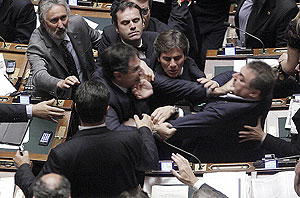EU leaders strike deal on eurozone debts
“Three-pronged” agreement reached in Brussels entails a 50 per cent cut in private banks’ Greek bond holdings.

French President Nicholas Sarkozy announced in Brussels on Thursday that European private banks had agreed to take a 50 per cent cut in their Greek bond holdings. He said the agreement “represents an effort of 100 billion euros [$150bn]”.
Al Jazeera’s Jonah Hull, reporting from Brussels, said: “In theory this agreement should help Greece and not spread contagion in the eurozone and other economies.”
Eurozone officials announced the deal after tough talks in Brussels between leaders of the eurozone and the Institute of International Finance (IIF) banking lobby to force the private sector to share the pain of Greece’s debt burden.
The agreement was the last and perhaps the toughest chapter to negotiate in a wide-ranging four-point plan to find a lasting solution to Europe’s debt crisis.
The IIF head, Charles Dallara, earlier met Sarkozy and German Chancellor Angela Merkel on the sidelines of a summit of the 17-nation euro area.
Banks get ‘haircut’
European leaders convincing the banks to erase billions in Greek debt was a key part of a grand deal that Sarkozy and other leaders had pledged to deliver at the summit, along with a bank recapitalisation plan and a beefed-up rescue fund to soothe fears of a global recession.
The banks had agreed to take a 21 per cent “haircut” on the Greek bondholdings as part of a second bailout for Athens agreed at a July summit, but the economic situation has deteriorated since then.
Merkel initially wanted the banks to accept a 60 per cent “haircut”, but the lenders had offered 40 per cent.
The announcement will help lift the euro as investors were more optimistic about the outlook for the region’s growth and single currency.
| IN VIDEO |
|
Andrew Simmons reports on the Greek debt crisis |
European leaders initially had remained deeply divided before the summit but an initial meeting involving officials from all 27 European Union member states made progress on plans to recapitalise the continent’s banks, according to David Cameron, the British prime minister.
Earlier in the day, Angela Merkel, Germany’s chancellor, received a boost before the summit when the German parliament voted in favour of plans to boost the EFSF, the $600bn mechanism set up to provide support to eurozone economies at risk of defaulting on debts
“The world is watching Germany and Europe to see if we are ready and able to take responsibility. If the euro fails, Europe fails,” said Merkel ahead of the vote.
Merkel has called for a 50 per cent write-down of Greek debt held by private sector companies including many European banks, far more than the 21 per cent loss agreed to by the private sector in July.
‘Structural reforms’
Greece, the region’s most troubled nation with debts of $484bn, has already implemented unpopular austerity cuts to access bailout funds from the EU and the IMF, but there are fears the crisis could spread to larger economies within the eurozone including Italy and Spain.
Europe has already bailed out three small eurozone members – Greece, Portugal and Ireland – and there are fears it cannot afford to bail out the troubled economies of Italy and Spain, the third and fourth largest economies in the bloc.
Yves Leterme, the Belgian prime minister, said EFSF would need resources of more than one trillion euro ($1.4tn) to prevent the currency union’s debt crisis from spreading.
 |
| Italian politicians exchanged blows in parliament as country faced heightened economic woes [Reuters] |
“I think that effectively, it has to be able to intervene a good deal beyond one trillion euro,” he said before the summit.
Greece has been pushed out of the limelight in recent days by Italy, which is under intense pressure to implement promised austerity and growth measures.
In unusually blunt terms, French, German and EU leaders told Silvio Berlusconi, Italy’s prime minister, to follow up on his reform commitments by Wednesday, in order to reassure markets.
The Italian prime minister has averted a government collapse to clinch an overnight deal on emergency growth measures demanded by the EU.
But there were scuffles in the Italian parliament as politicians came to blows over the tough economic reform programme.
Wednesday’s summit comes just over one week before European leaders have to face their G-20 counterparts in Cannes, France.
China and the US have warned European leaders of the urgency to solve the debt crisis amid concerns that failure could push the world into another recession.